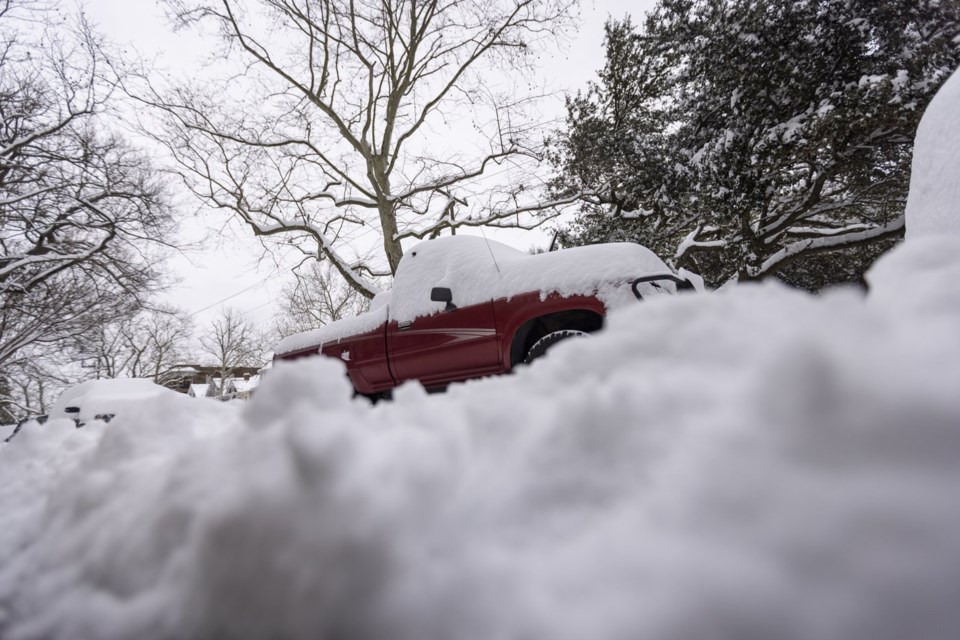NORFOLK, Va. (AP) — Roads in Virginia and North Carolina remained treacherous Thursday as unusually heavy snow led to hundreds of accidents, including crashes on an interstate that involved more than 50 vehicles. Meanwhile, a polar vortex sent temperatures plunging from the Northern Great Plains all the way to Louisiana.
Two separate collisions stopped traffic on Interstate 40 in Orange County, North Carolina, on Wednesday afternoon and the stopped vehicles were struck from behind, including a tractor trailer that hit a passenger vehicle, causing a fatality, according to the North Carolina State Highway Patrol. A total of 53 vehicles were involved in 12 crashes in the area, the highway patrol said. The driver of the tractor trailer was charged with misdemeanor death by motor vehicle and exceeding a safe speed for conditions.
The highway patrol responded to nearly 1,200 collisions statewide on Wednesday, according to Sgt. Christopher Knox. Crashes on Wednesday also closed portions of Interstate 95 and I-85 near Raleigh, North Carolina.
Virginia State Police reported early Thursday that there had been well over 800 crashes statewide since heavy snow pounded parts of the mid-Atlantic on Wednesday. At least 45 crashes involved injuries but no fatalities.
Emergency workers in Suffolk, Virginia, rescued two people from an SUV that crashed into water on Wednesday afternoon, according to the city’s Department of Fire & Rescue. Photos the department posted on social media showed rescuers stretching a ladder to the vehicle’s roof and helping one person clinging to the roof rails crawl across the ladder to land.
Wednesday’s snowfall in Norfolk, Virginia, ranked as the eighth-highest, one-day snowfall total the coastal city has ever recorded, Weather Prediction Center meteorologist Scott Kleebauer said. Norfolk officially recorded about 10.2 inches (about 26 centimeters) of snow, he said.
High snowfall isn’t unprecedented, he said, but it’s “certainly rare.”
“This is probably one of those one-in-10-years type storm,” Kleebauer said.
Children in the city of 230,000 on the Chesapeake Bay used boogie boards to sled down a small hill, while some adults cleared off cars with leaf blowers. Many roadways were still covered in slush, if not snow, while authorities urged everyone to stay off the roads to give plows time to come through.
Mary Stokes, whose family owns a small environmental consulting firm, said employees weren't able to go out into the field to conduct mold testing and other types of work to help homeowners and businesses stay compliant with environmental laws.
“We’re obviously not going to make them take a vacation day when they physically can’t come to work,” Stokes said while clearing off her SUV. “But we’re not making any money. It can definitely be a financial hit.”
Jared Brooks, a surgeon at a local hospital, predicted that schools wouldn’t reopen in Norfolk until at least Monday. The temperature wasn’t expected to rise above freezing on Thursday.
“People aren’t used to driving in these kinds of conditions,” Brooks said while shoveling the sidewalk outside of his house. “And they just don’t slow down appropriately. And they get kind of crazy. People just need to stay home and not even try to drive unless they have to.”
Schools were closed or relying on remote learning throughout large parts of Virginia and North Carolina, while several thousand electric customers were without power Thursday morning. About 1,800 flights were canceled or delayed on Thursday across the U.S., including about 250 flights in and out of Charlotte Douglas International Airport in North Carolina, according to the flight-tracking site FlightAware.com.
Meanwhile, an arctic air mass was bringing widespread, record-breaking cold to the central United States, and forecasters expected some locations in the Plains and Lower Mississippi Valley to experience their coldest temperatures on record this late in the season, according to the Weather Prediction Center. In Detroit, crews are fixing a large water main break that left dozens of people without power and heat amid temperatures well below freezing.
Frigid temperatures broke daily cold records Thursday across 45 weather stations ranging from North Dakota to Louisiana, Kleebauer said. Parts of Texas also broke daily cold records set in 2021 when a deadly winter storm caused the state’s power grid to mostly collapse.
In Nebraska, Grand Island set a new record for Feb. 20 of minus 24 Fahrenheit (minus 31 Celsius), breaking the old record of minus 11 F (minus 24 C) set in 1938, while Hastings set a new record of minus 20 F (minus 29 C), eclipsing the record of minus 12 F (minus 24 C) in 1918. In Missouri, new record lows were set in several cities, including Springfield at minus 12 F, breaking the record of 7 F (minus 14 C) in 1918, and Joplin at minus 9 F (minus 23 C), breaking the record low of 16 F in 1963, 1978 and 2021.
The National Weather Service in Dodge City, Kansas, was forecasting one more day of dangerous cold for western Kansas, with wind child dropping below minus 20 F in some locations Thursday morning. Wichita schools have been closed due to the cold since Tuesday, while many other Kansas schools opened late on Thursday.
But a “big change” is on the horizon, Kleebauer said. Thursday is expected to be the “last truly cold day” across the country as temperatures rise next week, he said.
___
Brumfield reported from Cockeysville, Maryland. Seminera reported from Raleigh, North Carolina. Associated Press writers Gary Robertson in Cary, North Carolina, and Steve Karnowski in St. Paul, Minnesota, contributed to this report.
Ben Finley, Makiya Seminera And Sarah Brumfield, The Associated Press



